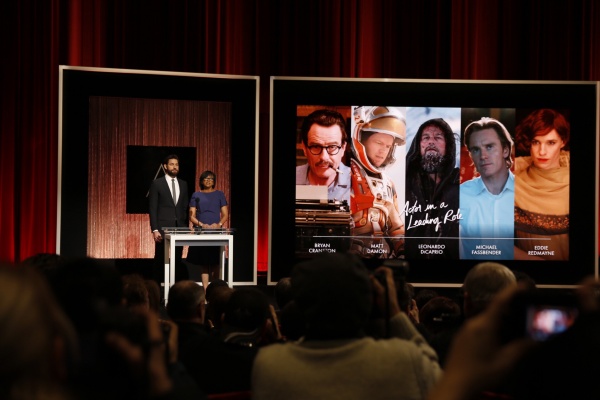The Oscars: A Dilemma of Diversity
TNS
Actor John Krasinski and Academy President Cheryl Boone Isaacs announce Best Actor at the announcement of the 88th Academy Awards nominations during a live news conference on Jan. 14, 2016 at the Academy’s Samuel Goldwyn Theater in Beverly Hills, Calif. (Al Seib/Los Angeles Times/TNS)
January 28, 2016
When it was announced that no actors of color were nominated for an Oscar at this year’s Academy Awards show, there was an understandable amount of outrage. Many saw the snubbing of popular actors such as Will Smith, Samuel L. Jackson, Idris Elba and Michael Jordon to be nothing short of a travesty, and some, such as Spike Lee and Jada Pinkett Smith, have called for an outright boycott of the ceremony. From this debacle, it became clear that underrepresentation is causing a very large problem in the film industry, and until recently, there just hasn’t been a large push to change the way things are done. For one reason or another, the “Academy,” as it is colloquially referred to, has always been seen as the ultimate judge of quality in the film industry, and their approval has been highly sought after and revered by actors, actresses and directors like dogs begging for a juicy steak.
But in this reverence, we forget that the Academy is comprised of normal people, and people have preferences. The global, digital-only publication Quartz reported that, based on an investigation conducted by the Los Angeles Times, 94 percent of Academy members were found to have been white as of 2012. Roughly 77 percent of the group were male, and only 14 percent were younger than 50. There are two other essential pieces of information regarding the group of people that nominates and ultimately chooses the winners of the Academy Awards—their names are not public record and membership is a lifetime commitment. This means that internal changes regarding membership cannot happen in short periods of time, and what we are seeing now is the glaring weakness of the Academy—there are simply not enough people from varied walks of life to qualify current members to accurately judge the artistic creations of our time.
If the Academy was comprised primarily of critics in their early 20s, we just might see more action flicks like “Transformers” or “Pacific Rim” up on the nomination board, so we can’t truly fault individuals for having preferences. However, we can certainly identify when these preferences stand in the way of fair representation.
When “Star Wars: The Force Awakens” merchandise hit toy stores, it soon came to light that manufacturers were specifically asked not to include the female character of Rey, despite her arguably being the film’s main protagonist. Her most notable exclusion was in the most recent Star Wars version of Monopoly, where all four of the playable pieces represent male figures, and her spot was taken by the character of Finn, played by John Boyega. The unavoidable fact is that Star Wars merchandise is and always has been marketed toward young males, and a female figure is often seen as unrelatable to the targeted audience. It’s an antiquated notion, but it’s one that has defined the toy industry for years and the reason why we don’t see female action figures, which sadly means that fair representation takes a bit of a hit.
The Academy, too, has shown that it has a very particular taste in film over the past few years. The term “Oscar Bait” refers to a film specifically made to catch the Academy’s attention during awards season, and it’s a very real thing. Films that glorify one side of important American historical events continuously hog all the attention when it comes time to discuss potential nominees, and these have included “American Sniper,” “Lincoln” and “Argo.” In fact, every single one of these films deserves more scrutiny for how it presents the ‘good and moral American’ in opposition with his less-than-reputable foe, but this simply doesn’t happen. Instead, these films demand an obnoxious command over Oscar nominations, with “American Sniper” having six nominations at last year’s awards while “Selma” only had two. (“Selma” only won Best Original Song.) In this environment, it is no wonder that a film like “Straight Outta Compton,” which presents rap culture through a strictly black lens, does not garner more attention—there is no relatable element for the Academy to latch on to. They are the boys turning their noses up at potential Rey action figures.
This is not to say that “Straight Outta Compton” deserved a nomination—that is not for me to decide. However, it is far too naive to assume that a critical body comprised of a white majority will review a film dealing with issues of black culture as favorably as it would a film that is far more relatable to their creative palette.
Because of this, the Academy is becoming less and less relevant. Last year, UCLA released a report on the state of diversity on Hollywood and found that, in 2013, more than half of all typical moviegoers identified as a minority. The social climate of the nation is changing, and whites are projected to become a minority by the year 2045, according to the U.S. Census Bureau. What we’re seeing isn’t so much racism on the part of the Academy but rather a presentation of the opinion of a self-important vocal minority. Some steps are being taken already, but the overwhelming presence of white members and the fact that lifetime memberships are being granted retroactively will make change come in only short, gradual steps. Without serious change, there will come a day when the Academy can no longer claim to represent the opinions of the American public.












